


Q Watch Abraham Verghese’s Ted Talk Called A Doctor’s Touch. Consider the corrective he offers to modern, technocratic medicine. His key message about the centrality of listening to the patient and engaging in a thorough physical exam ties together much of what we have talked about regarding ritual and the culture of biomedicine this past week. What do you think of the term he coined – the “i-patient”? Does this concept resonate with you and your experiences with US-style biomedicine (or perhaps someone close to you)? If so, how so? If not, why not? What do you think is the single most important message you would like to take with you if you are on a journey to become a care provider? If you are not, what would you most like your physician/s to hear and understand from this section of the class?
View Related Questions